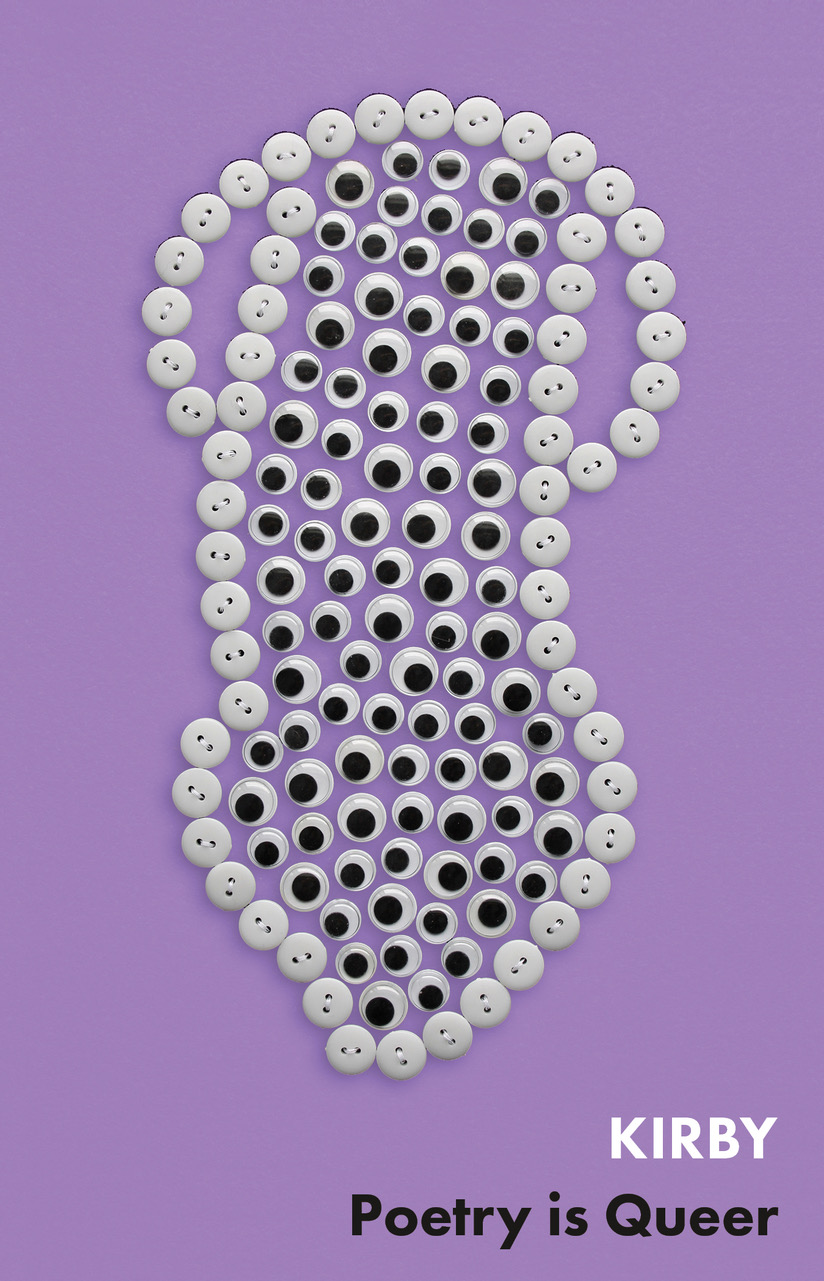Born in Toledo, Ohio to Lutheran parents who only gradually came to accept their queer identity after fearing they would be lost to them if they didn’t, Kirby is an amiable, proudly self-identifying queer writer who founded Knife Fork Book (KFB), an all-poetry bookstore, in Toronto in 2016 to overcome the commercial disregard of poets and poetry. Described by Gerald Hannon as “a cross between Jean Genet and a buddha on uppers”, Kirby has compiled a book of mini-essays as an impassioned manifesto that combines diaristic anecdote, vignette, epigram, list, and literary reflection. The book’s cover showing buttons arranged like a penis in outline presages its bold content. Facing the title page is a shot of Kirby photographing what seems to be Keith Haring’s washroom graffiti.

“QUEER POETRY shapes, reshapes my life, my body, my world, my pen, every living day,” Kirby proclaims, claiming the title of “professional homosexual” who has made a living “as a homosexual.” But a reader could wonder when and how poetry is queer. Is it queer because of content or the sexual identity of poets? Is it queer when pointing to an intersectionality and being attentive to identities and assumptions about what those entail? Kirby asserts that queer literature is constituted socially, geographically, spatially. They admire writers who stir or stroke the queer imagination (Sappho, Shakespeare, Whitman, Lorde, Rilke, Ginsberg, Rich, Lorca, Stein, Genet, Cavafy, Schuyler, Strand, Jarman, Moure, et al). There is an autobiographical underpinning for this admiration. Kirby’s birthplace was rotten for a queer kid in the mid-70s, their adolescent period, but what saved their pre-teen years were a Toledo library, the Toledo Museum of Art, and the local AMC multiplex. Kirby scrapped adolescence, “leaping from childhood to adult,” and has spent adult life (as they boast) “in pursuit of the phallic god.” They relish the polymorphous perverse, defining a terrorist, for instance, as “Someone who’s never felt a willing tongue up their ass.”
Poetry is Queer may be successful as a memoir-manifesto, but as a work of literary criticism, it is a small collection of hors d’oeuvres rather than a full meal. Many of the book’s thumbnail views are breezy over-generalizations (“the homosexual mind referred angles over curves”; “A queer eye finds beauty in that which enchants, bemuses, captivates, endears”) and their lists are simply that, for the most part: “Whitman contains multitudes. Rimbaud, a heavenly jam-pot. Verlaine, shit, cheese, and cum.” On occasion, sentences read like Dr. Joyce Brothers or Dr. Ruth, as in this bromide: “From the head down (or neck up), you may think you don’t matter, that ‘it’ shouldn’t matter, that you don’t want to be here. From the ground up, you entirely matter.”
Taken full-on, the book has nuggets of real value on contemporary queer poets (some of whom were unknown to me), and poetry as “a bodily thing.” It is a vehement defence of queer identity that stimulates the appetite, though perhaps without sating it.
Bios
Keith Garebian
Keith Garebian has published 27 books to date, including eight poetry collections, such as Frida: Paint Me as a Volcano (2004), Blue: The Derek Jarman Poems (2008), Children of Ararat (2010), Poetry is Blood (2018), and Against Forgetting (2019). His chapbook of cancer poems, Scan, edited by Shane Neilson, has just been published by Frog Hollow Press in a limited edition of 100 copies, and next year he will have two new poetry collections forthcoming from Mawenzi House and Frontenac House. One of his Derek Jarman poems was set to music for choir and instruments by Gregory Spears, in the company of a poem each by Thomas Merton and Denise Levertov, and can be heard on the CD “The Tower and the Garden” (Navona Records). Some of his poems have been translated into French, Armenian, Hebrew, Bulgarian, and Romanian. [updated in 2021]

